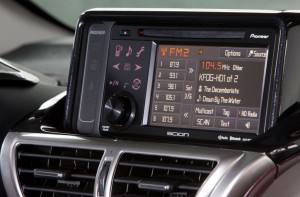
Drivers have more choices than ever to be entertained when behind the wheel, yet most still listen good ol' AM & FM radio.
Unless you like to hear the thrum of tires on pavement or the roar of your engine, odds are you’re listening to something else while driving, whether music, a prerecorded book, a game or perhaps news or talk.
These days, motorists have any number of options on what to listen to – and how. Most cars still have CD players while a growing number are adding satellite radio, MP3 players, Bluetooth audio and other options. But according to a new study, those old-school media, AM and FM radio, still reign supreme.
Even in cars equipped with all those new media sources, the vast majority of motorists told Ipsos Research that they’re most likely to listen to standard, terrestrial radio.
“Our studies show that despite all the technological advances we’ve made when it comes to digital listening, the vast majority of Americans still prefer AM/FM radio overall,” said Thomas Spinelli, vice president with Ipsos MediaCT, “and especially expect it to be a part of their cars – in fact, virtually all said they wouldn’t buy a car without a radio.”
That’s a big surprise to those who thought AM and FM were a dying breed. In fact, 84% told Ipsos they listen at one point or another, 62% saying they turn the radio on at least once a day. And 67% said AM & FM stations are their primary source of audio entertainment.
According to Ipsos, cost is a key factor behind in-car entertainment choices. Only a small share of American motorists stream audio while driving, and just a third of those actually pay for those services. Of those who currently don’t subscribe, 80% said they have no interest in paying for such services in the future.
Automakers have been tinkering with the formula when it comes to offering motorists options, and a growing number of vehicles now come with built-in satellite radio, sometimes with short-term free subscriptions aimed at getting drivers hooked. But pricing is a factor limiting adoption of satellite radio, as well.
(Automakers offer plenty of cameras for selfie generation. For more, Click Here.)
Then there’s the CD. In a world where automakers are looking for every possible way to trim weight – which helps improve fuel economy – several manufacturers have been toying with the idea of abandoning disk players. But the Ipsos study might give them pause. It shows that 64% of motorists still report using their CDs while driving – and, on average, they carry 10.5 CDs in their cars.
(Click Here for top 10 most annoying car features.)
The study didn’t break out entertainment trends by age, so it’s unclear if younger drivers are showing more interest in alternatives.
(To see more about how automakers are dealing with privacy issues, Click Here.)
But “We’re certainly seeing reluctance amongst Americans to pay for music in the in-car environment,” said Spinelli. “The ability to listen to free music is important to Americans, as is their comfort with their current AM/FM setup. However, as new vehicles roll out, many of which are equipped with built in digital music services, we may see a shift in how Americans are thinking about listening in their cars.”

Most people IME that desire to use AM/FM are interested in being entertained by talk radio more than listening to music. Many consumers also believe that paying for music that they can steal or bring to the vehicle themselves via CD, DVD etc. is unacceptable. Some folks even like to listen to radio advertisements so everyone has a choice.
Unfortunately for many people, cellphones/texting and distracted driving has replaced proper driving and listening to music or radio.
we’ve had satellite reception in two vehicles but when driving locally I prefer a local station, especially if an emergency or violent weather should arise. Outside of our local area, CD or satellite does get used but only if I have trouble finding a format I prefer. (Classic rock)
Radio is limited in this city of 90,000 so the “5 months for $20” for satellite makes sense mid-April to Sept then thank goodness for about 60 hrs of music on an SD card my radio has a slot for. But I wish we did have good radio choices, as the article notes.
The term “talk radio” is a redundancy – virtually ANY AM/FM station is almost all talk. Personally, I neither like nor need talk radio; I have no trouble thinking for myself and have no need for someone (let alone someone on the radio) to tell me how or what to think.